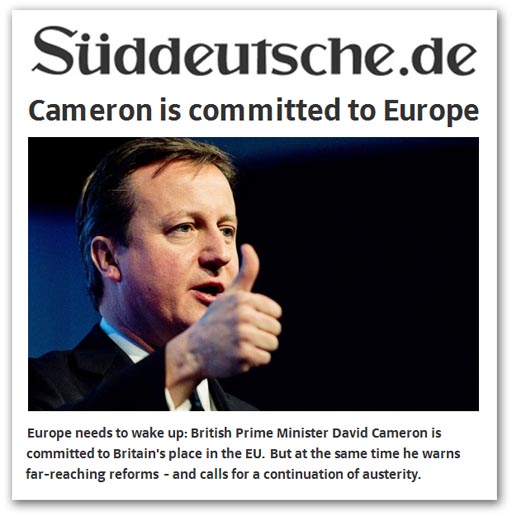There was Mr Cameron embarked upon a European blitz, visiting Spain, France and Germany, intent on seeking reform of the very institutions which Lady Thatcher had already dismissed as "unreformable", and he is called back to attend upon her, leaving unsaid his messages to the European statesmen whom he had planned to meet.
In casting her last spell on EU politics, the very thing that brought her down, Thatcher has perhaps spared David Cameron a degree of embarrassment. For, while he seeks – as far as he can – to convey his euroscepticism to his domestic audience, the image abroad is one of unremitting europhilia. And the longer his European tour, the greater was the chance of him being found out.
Certainly, there was a marked contrast this morning between the domestic and foreign press.
While The Daily Telegraph, for instance, headlined, "EU failings can't be 'brushed under the carpet', David Cameron to tell leaders", Süddeutsche Zeitung headed an exclusive interview with, "Cameron is committed to Europe".
Then, while the Daily Mail has Cameron saying, "UK support for EU membership is wafer-thin", the Spanish El Pais had a headline that he would not like to see emblazoned on a British newspaper, reading as it did, "The best solution for the UK is to stay in a reformed EU".
The paper refers to the premier's speech of 23 January, when he announced his intention to hold a referendum, and Cameron is then asked whether, if the referendum went against him, he would be willing to withdraw from the EU. And his answer is blunt and to the point: "I would not. What I would like is to get reform of the European Union".
For the Daily Express, though, the story is also that British support for the EU is "wafer-thin", leaving it for Le Monde to headline: "David Cameron: 'Stay in a reformed EU'".
Mr Cameron was due to meet François Hollande this evening for dinner, and in preparation he had emphasised to the French as well he was not ready to withdraw from the EU. The best outcome for Great Britain is to remain in a reformed EU, he says.
Thus, even as Margaret Thatcher was on her death bed, the heir to Blair was reassuring the European media that he had no intention of leaving the EU, while presenting a much harder line to the British press.
Love her or loathe her, at least with Thatcher, you knew where you stood. When, earlier in her career, she was in favour of the European projet, there was no mistaking her support. And when she turned against it, her views were equally unequivocal.
Never in a million years, in the latter phase of her career, could Süddeutsche Zeitung have carried a headline: "Thatcher is committed to Europe". That Mr Cameron is comfortable with that headline illustrates how much we have lost today.
COMMENT: THATCHER COMBINED THREAD
